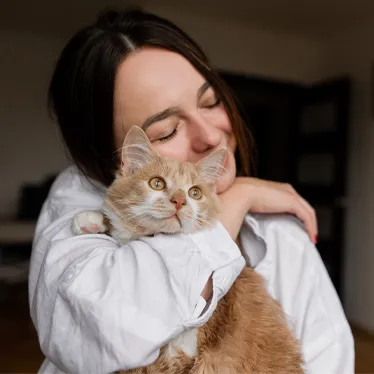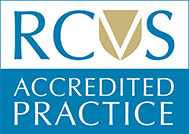Vaccination is the only safe way to provide immunity against a number of dangerous diseases that continue to infect cats in the UK. When kept up to date, as recommended by your vet, regular vaccination can keep your pet protected for life.
Immunity and cat vaccination
Immunity is the body’s natural ability to fight infection. Vaccination confers immunity by exposing the body to a small but entirely harmless dose of the disease in question.
Immunity in kittens
Kittens are usually protected during the first few weeks of life by an immunity passed through the mother’s first milk (colostrum). However, this immunity fades rapidly, leaving the kitten susceptible to disease within a few weeks. At this point, vaccination can take over in providing protection.

What diseases do we vaccinate against?
Cat ‘flu (feline upper respiratory tract disease)
Common in the UK and can be very serious, especially in kittens and older cats. It is spread between cats by direct contact or through sneezing. Symptoms include a runny nose and eyes, high temperature, and extreme lethargy. Regular vaccination is the most effective means of preventing the disease.
Infectious enteritis (feline panleucopenia)
This unpleasant, often fatal disease is now relatively rare, with vaccination proving extremely successful in controlling its spread.
Feline leukaemia
A viral disease, transmitted when cats fight each other or even during grooming. It can take months to develop after infection, but then it will begin to suppress the cat’s immune system, causing secondary infections, tumours and death. Vaccination is gradually bringing this disease under control.
Chlamydophila felis
It can cause conjunctivitis and is mainly seen in kittens and multi-cat households.
Rabies
A fatal disease not found in the UK. Vaccination is mandatory if you plan to travel abroad with your cat.
Kittens first vaccination
When your kitten is first vaccinated, they usually receive a course of four injections. The first three are given 4 weeks apart, with the final vaccine administered at around 26 weeks of age. This primary course can be given as early as 8 weeks of age – but if you acquire a kitten that is already older, consult your vet about vaccination timings. The vet will also give your kitten a general health check at the same time.
Vaccination doesn’t work immediately; it takes a few days for immunity to develop. Your vet will advise you on when it is safe to let your kitten interact with other animals.
Immunity to a disease may gradually fade, leaving your cat at risk. Depending on the disease, boosters may be needed. An annual visit to the vet will allow for a general health check and any necessary boosters to be given.
You will be given a vaccination card which contains a record of the vaccination and tells you when the next booster is due. Catteries will need to see this, so keep it in a safe place and bring it with you on your cat's annual check-up.
Book a vaccination appointment
Spread the cost of essential healthcare for your pet

To spread the cost of pet vaccinations, Alder Vets offers the Pet for Life Health plan, which includes vaccinations for your pets, including kennel cough for dogs.
New kitten?
Getting your kitten vaccinated is essential for your new pet’s health and plays a pivotal role in their preventative healthcare throughout their life. Register your pet with us online today to book an appointment at Alder Vets.








We are open 6 days a week in Guildford
Find us